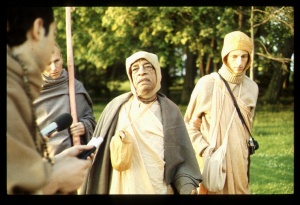SB 6.17.12

A.C. Bhaktivedanta Swami Prabhupada
TEXT 12
na veda dharmaṁ kila padmayonir
na brahma-putrā bhṛgu-nāradādyāḥ
na vai kumāraḥ kapilo manuś ca
ye no niṣedhanty ati-vartinaṁ haram
SYNONYMS
na—not; veda—knows; dharmam—the religious principles; kila—indeed; padma-yoniḥ—Lord Brahmā; na—nor; brahma-putrāḥ—the sons of Lord Brahmā; bhṛgu—Bhṛgu; nārada—Nārada; ādyāḥ—and so on; na—nor; vai—indeed; kumāraḥ—the four Kumāras (Sanaka, Sanat-kumāra, Sananda and Sanātana); kapilaḥ—Lord Kapila; manuḥ—Manu himself; ca—and; ye—who; no—not; niṣedhanti—order to stop; ati-vartinam—who is beyond laws and orders; haram—Lord Śiva.
TRANSLATION
Alas, Lord Brahmā, who has taken his birth from the lotus flower, does not know the principles of religion, nor do the great saints like Bhṛgu and Nārada, nor the four Kumāras, headed by Sanat-kumāra. Manu and Kapila have also forgotten the religious principles. I suppose it to be because of this that they have not tried to stop Lord Śiva from behaving improperly.